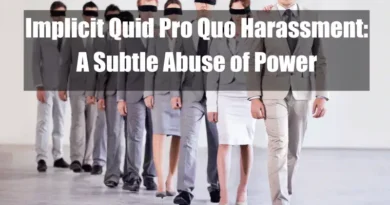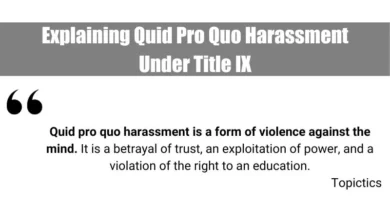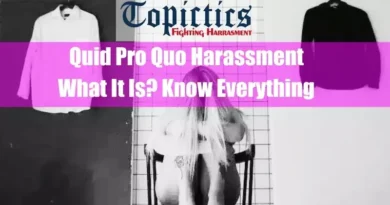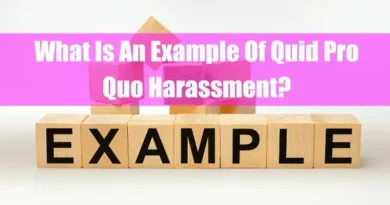How to Report Quid Pro Quo Harassment in Schools?
Takeaways
| Key Points |
|---|
| Recognizing and reporting quid pro quo harassment in schools is crucial for ensuring a safe learning environment, and the first step is understanding that this form of harassment occurs when an authority figure conditions academic or professional benefits on compliance with unwelcome sexual advances. |
| Once identified, victims or witnesses should locate the school’s Title IX Coordinator, who is responsible for handling such complaints under federal law, and can often be reached through the school’s website, student handbook, or direct contact. |
| Reports can be made verbally, in writing, or through online reporting systems, with key details such as dates, times, locations, and evidence being essential to ensure a thorough investigation. |
| Filing a formal Title IX complaint triggers an official investigation, requiring the complainant to submit a detailed report, specify evidence, and request necessary protective measures such as counseling or academic accommodations. |
| Proper documentation of all communications and reports is critical to support the complaint and facilitate a fair resolution, ensuring accountability and protection for the victim. |
Introduction
Quid pro quo harassment is a serious violation that can occur in educational settings, where a student, staff member, or other individuals are pressured into providing something of value (such as sexual favors) in exchange for benefits like grades, recommendations, or continued employment. Title IX, a federal law in the United States, specifically addresses and prohibits this form of harassment in schools.
Recognizing and reporting such incidents is crucial for maintaining a safe and equitable educational environment.
Steps to Report Quid Pro Quo Harassment in Schools

Step 1: Recognizing Quid Pro Quo Harassment
Recognizing quid pro quo harassment is the first step toward addressing it. This form of harassment typically involves an authority figure (such as a teacher, coach, or administrator) who conditions benefits or threatens disadvantages based on a student or subordinate’s response to unwelcome sexual advances or demands. Unlike other forms of harassment, quid pro quo directly links the victim’s response to tangible academic or employment outcomes.
Key indicators of quid pro quo harassment include:
- Requests for sexual favors in exchange for grades, recommendations, or other academic benefits.
- Threats of negative consequences, such as failing grades or poor performance reviews, if the demands are not met.
- Unwelcome advances that are tied to decisions affecting the victim’s academic or professional status.
Understanding these signs is essential for victims and bystanders to recognize when quid pro quo harassment occurs and take the necessary steps to report it.
Step 2: Identifying the Appropriate Reporting Channels
Once quid pro quo harassment is recognized, the next step is identifying the appropriate channels to report the incident. Under Title IX, schools are required to have a Title IX Coordinator who is responsible for overseeing the school’s compliance with Title IX regulations, including handling complaints of sexual harassment.
Steps to identify and contact the appropriate reporting channels:
- Contact the Title IX Coordinator: Every educational institution receiving federal funding must designate at least one Title IX Coordinator. This individual is responsible for receiving reports and ensuring they are investigated properly.
- Access the school’s Title IX resources: Schools often provide information about how to report harassment on their websites or through student handbooks. It’s essential to locate this information to understand the reporting process.
- Utilize additional reporting avenues: If the Title IX Coordinator is not accessible or if the situation requires immediate attention, reports can also be made to school administrators, teachers, or other trusted staff members.
Step 3: How to File a Report (Verbal, Written, Online)
Filing a report of quid pro quo harassment can be done in various ways, depending on the resources available at the school. The most common methods include:
- Verbal Reports: These can be made in person or over the phone to the Title IX Coordinator or another school official. When making a verbal report, it’s important to provide as much detail as possible about the incident, including dates, times, locations, and the identities of those involved.
- Written Reports: Written complaints can be submitted via email, letters, or online reporting system if available. A written report should include a detailed account of the harassment, any evidence (such as emails or text messages), and a clear statement that the complainant wishes to file a formal complaint under Title IX.
- Online Reporting: Some schools provide online portals where students and staff can report incidents of harassment anonymously or directly. These systems often guide the reporter through the process, ensuring that all necessary information is captured.
Regardless of the method chosen, it is crucial to document the report and retain copies of any correspondence or forms submitted. This documentation can be vital for any subsequent investigation.
Step 4: Filing a Formal Complaint
Filing a formal complaint under Title IX initiates the school’s official investigation process. This step is crucial as it compels the school to address the allegations and take appropriate action.
Steps to file a formal complaint:
- Submit the complaint to the Title IX Coordinator: A formal complaint must be submitted to the Title IX Coordinator, who will then trigger the investigation process.
- Include detailed information: The complaint should include the complainant’s identity, a clear statement of the facts, and any evidence supporting the claim. It should also specify that the complaint is being filed under Title IX.
- Request specific actions if needed: While filing the complaint, the complainant can request specific actions, such as the implementation of protective measures, the provision of counseling services, or academic adjustments during the investigation process.
What Happens After Reporting?
Investigation Process
Once a report or formal complaint is filed, the school is obligated under Title IX to conduct a prompt and impartial investigation. The process generally includes:
- Notice to both parties: The Title IX Coordinator will notify the complainant and the respondent of the allegations, the process, and their rights during the investigation.
- Collection of evidence: The school will gather evidence, which may include interviews with witnesses, reviews of documents, and any other relevant materials.
- Interviews: Both the complainant and the respondent will be interviewed as part of the investigation. Each party has the right to present evidence and witnesses.
Interim Measures and Support Available
During the investigation, schools are required to offer supportive measures to both parties. These measures are designed to protect the complainant from further harassment and to ensure that the educational environment remains accessible to both parties. Common interim measures include:
- Academic accommodations: Adjustments to class schedules, assignment extensions, or other academic accommodations may be provided.
- No-contact orders: Schools can issue no-contact orders to prevent further interaction between the complainant and the respondent.
- Counseling services: Access to mental health services and counseling may be provided to support the emotional well-being of the complainant.
Follow-up and Communication

Throughout the investigation process, the Title IX Coordinator or other school officials should maintain communication with the complainant to update them on the progress of the investigation, any actions taken, and the timeline for resolution.
This ongoing communication is essential for ensuring transparency and trust in the process.
Rights and Protections During the Reporting Process

Confidentiality of the Reporting Party
Under Title IX, schools are required to protect the complainant’s confidentiality to the extent that it does not interfere with the institution’s ability to conduct a thorough investigation or ensure the safety of the educational environment.
The complainant’s identity and the details of the complaint should only be shared with individuals who need to know to carry out these responsibilities. However, certain information may need to be disclosed in some cases to ensure a proper and impartial investigation.
Protection Against Retaliation
Title IX also provides robust protections against retaliation for those who report harassment. Retaliation can include any adverse action against the complainant for filing a report, such as threats, intimidation, or disciplinary action. Schools must take immediate and appropriate steps to prevent and address retaliatory behavior.
Next Steps if the Report is Not Addressed
Escalating the Complaint to the Department of Education’s Office for Civil Rights (OCR)
If a school fails to address a report of quid pro quo harassment adequately, the complainant has the right to escalate the issue by filing a complaint with the Department of Education’s Office for Civil Rights (OCR). The OCR is responsible for enforcing Title IX and can investigate complaints of non-compliance.

Steps to escalate a complaint:
- File a complaint with the OCR: The complaint can be filed online, by mail, or via email. It must be filed within 180 days of the alleged violation.
- Provide detailed information: The complaint should include a detailed account of the harassment and how the school failed to address it.
Seeking Legal Counsel
In cases where the school’s response is inadequate or additional legal action is necessary, it may be advisable to seek legal counsel. An attorney with experience in Title IX cases can provide guidance on the legal options available and help navigate the process of pursuing further action.
Reporting Challenges and Common Barriers

Fear of Retaliation
One of the most significant barriers to reporting quid pro quo harassment is the fear of retaliation. Victims may worry about negative consequences, such as being ostracized by peers, receiving lower grades, or even facing disciplinary action. Schools must address these concerns by providing clear assurances and protections against retaliation.
Lack of Awareness or Access to Reporting Channels
Another common barrier is a lack of awareness about the reporting channels available or difficulty accessing them. Schools must ensure that students and staff are fully informed about their rights under Title IX and know how to report harassment. This includes making information easily accessible on school websites and in student handbooks.
Addressing these Barriers
To address these challenges, schools should take proactive steps such as:
- Education and training: Regular training sessions for students and staff on Title IX and the reporting process can help raise awareness and reduce fears of retaliation.
- Clear communication: Schools should communicate their commitment to protecting students from harassment and retaliation clearly and consistently.
Conclusion
Reporting quid pro quo harassment in schools is vital for maintaining a safe and fair educational environment. By understanding the steps involved—from recognizing the harassment to filing a formal complaint under Title IX—students and staff can take proactive measures to address and stop harassment.
Schools must provide clear reporting channels, protect the confidentiality of those involved, and prevent retaliation. If the school’s response is insufficient, further actions, such as escalating the complaint to the Department of Education’s Office for Civil Rights or seeking legal counsel, are available.
These processes ensure that victims are supported and that educational institutions are held accountable for upholding Title IX protections.
FAQ
How should schools handle off-campus incidents of quid pro quo harassment?
Schools, particularly under Title IX regulations, are required to handle off-campus incidents of quid pro quo harassment when those incidents are tied to educational programs or activities under the school’s authority. This includes situations like off-campus housing, school events, and study-abroad programs.
The U.S. Department of Education’s 2020 updates require educational institutions to address quid pro quo harassment cases if they fall under the school’s authority, aligning with their commitment to addressing sex-based discrimination, though the scope and conditions are more limited than in prior guidelines.
If an incident outside of school affects a student’s participation or well-being in school activities, schools are required to investigate and provide remedies only if they exercise substantial control over both the harasser and the context where the harassment occurred.
What are the specific responsibilities of faculty when witnessing or being informed about quid pro quo harassment?
Faculty members at K-12 schools are “mandatory reporters,” meaning they must report any witnessed or informed instance of quid pro quo harassment to the school’s Title IX coordinator or appropriate authority. This responsibility is required under Title IX regulations, which obligate school employees to report any knowledge of harassment.
All school staff must report such incidents because they are mandatory reporters under Title IX, which helps ensure that schools can promptly and effectively address the complaints. Failure to report may result in disciplinary actions and, in some cases, legal consequences and could also impair the school’s ability to respond appropriately.
What are the legal repercussions for schools failing to investigate quid pro quo harassment?
If a school fails to investigate or address quid pro quo harassment, it can face significant legal consequences. Under Title IX, schools are required to take prompt and effective action in response to complaints of harassment. Failure to do so may result in lawsuits, loss of federal funding, and penalties imposed by the Office for Civil Rights (OCR).
Additionally, if a school neglects its responsibility under Title IX, affected students may experience long-term educational and personal harm, and the school could be held liable if it is proven that its failure to respond effectively contributed to the harm.
What is the legal definition of “quid pro quo” harassment under Title IX?
Under Title IX of the Education Amendments of 1972, “quid pro quo” harassment occurs when an individual in a position of authority within an educational institution conditions a student’s participation in a program or activity on submission to unwelcome sexual conduct. This form of harassment is recognized as a violation of Title IX, which prohibits sex-based discrimination in federally funded education programs.
Who holds the “duty of care” in preventing quid pro quo harassment in schools?
The “duty of care” refers to the legal obligation of school authorities, including teachers, school governing bodies, and educational departments, to provide and maintain a safe environment free from all forms of victimization and abuse. This duty encompasses the prevention and addressing of quid pro quo harassment.
What constitutes “abuse of authority” in the context of quid pro quo harassment?
“Abuse of authority” involves individuals in positions of power within educational institutions exploiting their status to solicit sexual favors from students. This exploitation is a key element in quid pro quo harassment cases, where authority is misused to gain sexual compliance.
How does “respondeat superior” apply to schools in cases of quid pro quo harassment?
“Respondeat superior” is a legal doctrine holding employers liable for their employees’ actions within the scope of employment. In educational settings, if a teacher or staff member engages in quid pro quo harassment, the institution may be held liable under this principle, especially if the harasser was acting within their professional capacity.
What is the significance of “actual knowledge” in reporting quid pro quo harassment?
“Actual knowledge” refers to a school’s awareness of harassment allegations. For an institution to be held liable under Title IX, it must have actual knowledge of the harassment and respond with deliberate indifference. This means that appropriate school officials must be informed of the misconduct so that the institution can legally act.
What does “deliberate indifference” mean in the context of a school’s response to harassment reports?
“Deliberate indifference” occurs when a school, upon receiving actual knowledge of harassment, responds in a clearly unreasonable manner under the circumstances. This standard is used to determine a school’s liability under Title IX for failing to address known instances of quid pro quo harassment.
How does the “hostile environment” standard differ from quid pro quo harassment?
A “hostile environment” is created when unwelcome conduct of a sexual nature is so severe, pervasive, and objectively offensive that it denies an individual equal access to educational opportunities. Unlike quid pro quo harassment, which involves explicit exchanges, hostile environment harassment pertains to the overall atmosphere and its impact on the victim’s educational experience.
What role does the “Equal Employment Opportunity Commission (EEOC)” play in addressing quid pro quo harassment in educational institutions?
The EEOC enforces federal laws prohibiting employment discrimination, including sexual harassment. While its primary focus is on employment, the EEOC’s guidelines and definitions influence how educational institutions develop policies to prevent and address quid pro quo harassment among employees and staff.
What is the “standard of liability” for schools under Title IX concerning quid pro quo harassment?
The “standard of liability” refers to the criteria under which a school can be held legally responsible for harassment. Under Title IX, a school is liable if it has actual knowledge of the harassment and responds with deliberate indifference. This standard was established in the Gebser v. Lago Vista Independent School District cases.
How does the “preponderance of evidence” standard apply in investigations of quid pro quo harassment in schools?
The “preponderance of evidence” standard is used in Title IX investigations to determine whether harassment occurred. This standard requires that the evidence shows it is more likely than not that the harassment took place, meaning there is greater than a 50% chance that the claim is true.









